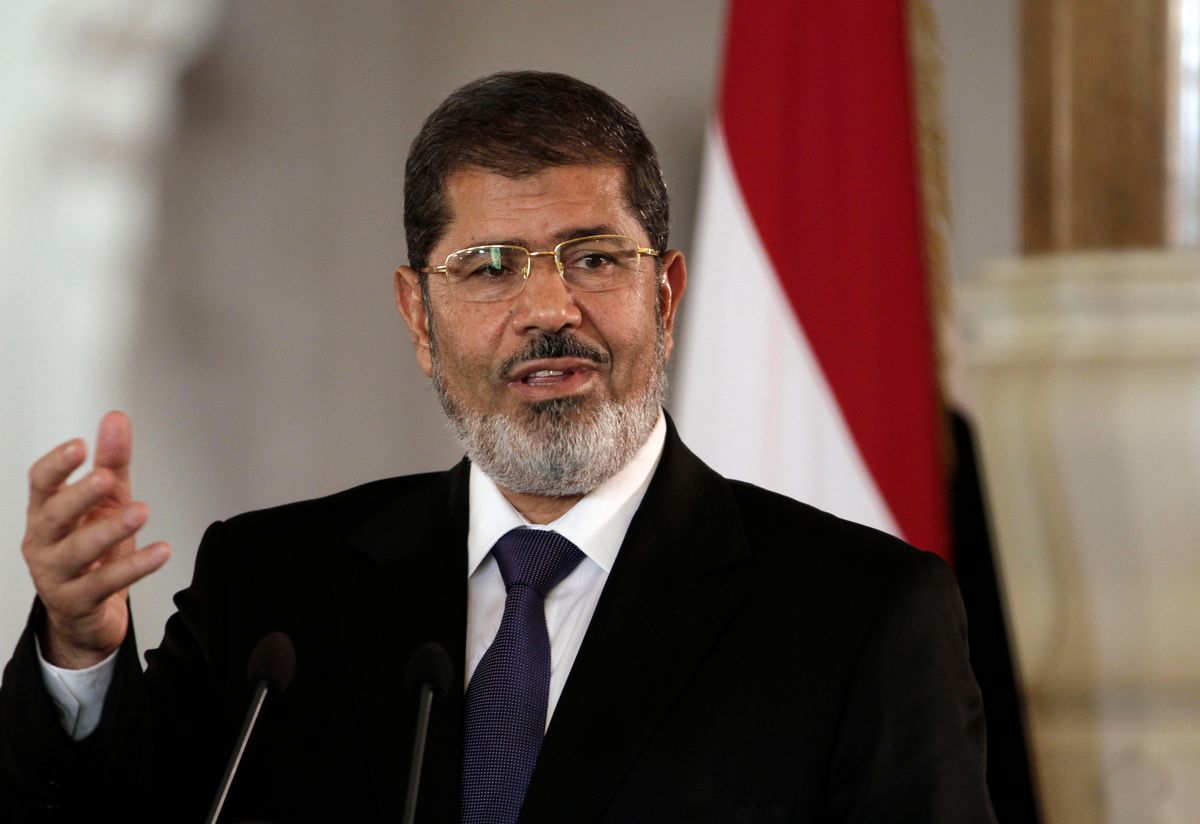 CAIRO, Egypt — Israel’s searing military offensive on the Gaza Strip is threatening to ensnare its Egyptian neighbor, where the powerful Muslim Brotherhood is calling on its leaders to sever ties and hundreds of demonstrators have taken to Cairo’s streets in protest.
CAIRO, Egypt — Israel’s searing military offensive on the Gaza Strip is threatening to ensnare its Egyptian neighbor, where the powerful Muslim Brotherhood is calling on its leaders to sever ties and hundreds of demonstrators have taken to Cairo’s streets in protest.
The escalating violence in Gaza and southern Israel, in which 15 Palestinians and three Israelis have so far been killed, presents an early diplomatic and political test for Egypt’s new president and former Brotherhood leader, Mohamed Morsi.
Morsi is under international pressure to safeguard Egypt’s decades-long peace treaty with Israel. But he is also facing calls at home, and even from within his own party, to take a harsher stance on Israel in light of the ongoing strikes.
“If Morsi does not align with Hamas we will remove him,” said Abdullah Al Desouqi, a member of the Brotherhood’s Freedom and Justice Party in South Sinai. Hamas is the Islamist movement now in control of the Gaza Strip.
“He is meant to be the voice of the Egyptian people,” he said. “And the Egyptian people will fight for Palestine.”
Morsi on Thursday convened an emergency cabinet meeting that included Egypt’s minister of defense, Abdullah Al Sisi. Egypt’s intelligence chief cut short a trip to Turkey to also address the Gaza crisis.
Earlier in the day, in a televised address, Morsi called the Israeli attacks “unacceptable.” On Wednesday — following Israel’s assassination of Hamas military commander, Ahmed Al Jabari — he recalled Egypt’s ambassador to Israel, Atef Salem Al Ahl, and called on the United Nations Security Council to meet on the crisis.
The Brotherhood has called for nationwide protests Thursday and Friday to press leaders to cut relations with Israel.
Dozens of demonstrators descended on the Arab League building in Cairo Thursday to demand the regional organization take further action to halt the violence, waving both Palestinian and green Hamas flags.
“This is not just a Palestinian issue, it is an issue for the entire Arab world,” said Ola Hanafi, a 26-year-old pro-Palestinian activist in Cairo. “Morsi’s actions so far have been very weak.”
Another woman, 28-year-old Shaimaa Shabaan, said she was drawn to protest by the images of dead and wounded children in Gaza that were circulating in the media on Wednesday. Egypt administered Gaza from 1948 to 1967, when Israeli forces captured it in the Six-Day War with Egypt, Jordan and Syria.
“We want [Morsi] to cut all relations with Israel until the violence stops,” Shabaan said.
Indeed, many disaffected Egyptians drew parallels Thursday between the policies of Morsi and former President Hosni Mubarak, largely viewed as a lackey of US foreign policy in the region.
Mubarak has withdrawn Egypt’s ambassadors to Israel on a number of occasions over the years for Israeli assaults in Lebanon and the Palestinian Territories. Mubarak, like Morsi, opened Egypt’s Rafah border with Gaza for those needing medical help, but did little else for Palestinians living there.
Before they assumed power, the Brotherhood’s clerics and officials often gave fiery anti-Israel and pro-Palestinian speeches, lambasting the Mubarak regime for failing to act against Israeli aggression.
But the message, at least at the higher levels of Brotherhood leadership, is today much more tempered as they grapple with the realities of international diplomacy and Egypt’s faltering economy.
“We are bound by a treaty [with Israel],” said leading Freedom and Justic Party member in Cairo, Karim Radwan. “And although we oppose the strikes, we have to stick to the terms of the treaty. We can only mediate between the two.”
Even if there were no treaty, Egypt’s Morsi is unlikely to commit military support to Gaza, which would likely spark a war with Israel, analysts say.
“[The army] has been restructured in a way that will not permit them to go head to head with Israel, nor should they,” said Hisham Kassem, a Cairo-based writer and analyst.
Egypt is fighting its own Islamist insurgency in the volatile Sinai Peninsula that borders both Israel and Gaza, and accuses Palestinian groups of participating in attacks on Egyptian soil.
The accusations have dampened Egyptian support for Hamas and other Gaza-based groups, and may stifle the rising domestic pressure against Morsi.
“Egyptians on the whole are sympathetic with Palestinians, but not with Hamas,” Kassem said.
Israel has also called on Egypt to crack down harder on Sinai fighters, who have also carried out assaults against Israeli border patrols.
Any reprisals against Israel from Sinai-based militant groups could provoke either Egypt or Israel to act, adding another potentially destabilizing layer to the conflict.
Egypt has long lamented that the peace treaty hinders its ability to quash militants there, and Freedom and Justice Party leaders have recently called for Morsi to amend the treaty to allow more flexible troop movement for Egypt’s army.
“Israel thinks Gaza is its playground and that Sinai can be, too,” Al Desouqi said. “But we will never let that happen."



Shares